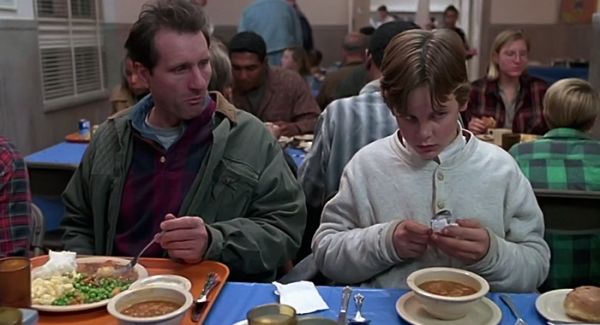
When it comes to holiday movies two John Hughes productions generally come to mind. For Christmas, people typically turn to Home Alone (1990) while for Thanksgiving Planes, Trains & Automobiles (1987) has become a staple. But nobody thinks about Dutch (1991). Dutch, which combines the child in peril hijinks of Home Alone with the plot of Planes, Trains & Automobiles and the moral lessons of Uncle Buck (1989), would seem to be an obvious contender as a holiday classic. Yet, Dutch remains a relatively obscure film in the John Hughes canon.
The titular character (Ed O’Neill) is a working class man who has pulled himself up by the boot straps to become a major developer in the Chicago area. Nevertheless Dutch’s construction company and “new money” isn’t enough to get him into his girlfriend’s (JoBeth Williams) elitist country club circle. In order to gain access to this world and to make his girlfriend’s holiday “special” he has decided to go to her son Doyle’s (Ethan Embry) boarding school in Georgia to embark on a road trip back to Chicago with the boy in order to form some kind of bond. What Dutch didn’t count on is that Doyle, still very much affected by his parents’ divorce, is an angry, spoiled, and dangerous brat.
Hughes’ script trades on a series of tried and true jokes lifted from his earlier efforts. What’s worse is that Hughes continues to be blind to how class functions in American society. This great propagandist of Reagan era values cannot imagine protagonists who aren’t middle class and white. Although Dutch, like Uncle Buck, is labeled “working class” his character is very much middle class. Likewise those characters in Hughes’ scripts labeled “middle class” are actually upper class. The plots to Hughes’ films don’t require this kind of deception any more than they call for the characters to come from privilege.
What’s even more disturbing about Dutch and Hughes’ films as a whole is how these perverted politics of class extend to issues of race. Generally speaking Hughes treats characters of Color as being worthy of little more than chauffeuring his white characters around or cleaning up after them. In Dutch specifically People of Color are janitors or benevolent figures of Capra-esque compassion who dispense heartwarming sentiments as they populate the mise en scène of a shelter for displaced families.
There’s a scene in Dutch that, from the perspective of some thirty-plus years later, is more troubling still. After Dutch and Doyle have stowed away on a truck they end up in a warehouse complex. No sooner does Dutch suggest that the pair ask a guard for directions the film cuts to the pair being beaten by two guards with nightsticks. This act of unwarranted violence is played for laughs not once but twice. First when the guards eject Dutch and Doyle and again when Doyle dishes out some revenge via his cool karate moves. For Hughes violence exists with out emotion; there is no trauma and no regrets. In this scene of savagery Hughes compresses the rampant sadism of Home Alone into a single sequence whose detachment from reality is such that it takes on a surreal quality.
And let us not ignore the title character himself. The lessons in masculinity that Dutch imparts to Doyle are executed with the toughest of love and reveal Hughes’ fetishization of “tough guy” types. Doyle is another in a long line of insecure masculine characters in Hughes’ films who is desperately trying to both affirm himself and define himself in the context of mid-twentieth century masculinity. Dutch, the epitome of those values, is a violent, narcissistic bully who hides behind his class identity. Of the surrogate fathers and brothers that Hughes presents in his films Dutch is the most shockingly relevant of such figures because his social and political morality essentially provides a bridge between the conservative values of the Reagan era with those of the Trump era.
Basically Dutch sucks and that’s why it’s not a holiday classic. One looks at this film that ends with a guy who owns a sizable construction company and a trust fund kid riding in the back of a Black homeless family’s car as they hitch a lift to a sprawling estate with a mansion and stable on Thanksgiving morning and it’s impossible to feel anything other than shame and disgust. What does Hughes want his audience to feel? Well he assumes that his audience will swallow one messy turd as easily as they did his last and thank him for it cause they usually do.
